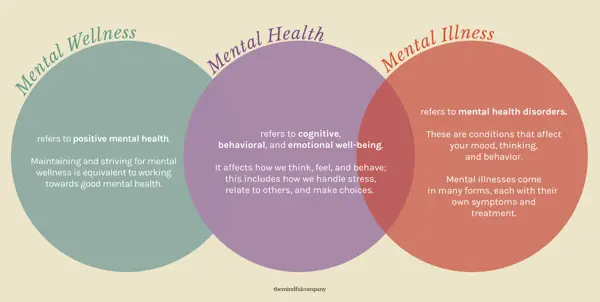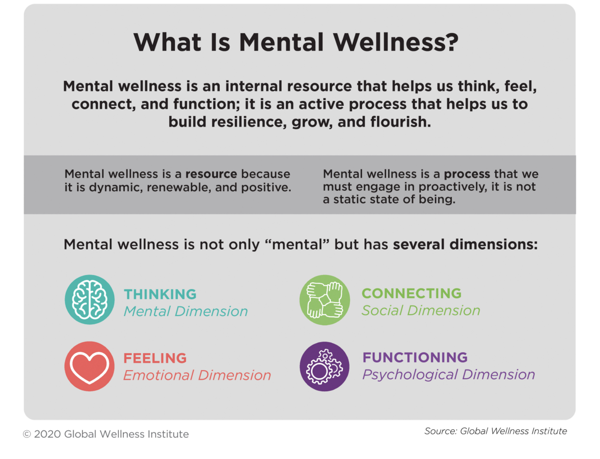When it comes to our overall well-being, it's important to recognize the difference between mental and spiritual health. While these two aspects of health are interconnected, they serve different purposes and require distinct forms of care and attention. In this article, we will explore the nuances of mental and spiritual health and how they contribute to our overall wellness.
Table of Contents
- Defining Mental Health
- Defining Spiritual Health
- Differences Between Mental and Spiritual Health
- Impact on Overall Well-being
- Practices for Mental Health
- Practices for Spiritual Health
- Conclusion
Defining Mental Health
Mental health refers to our emotional, psychological, and social well-being. It encompasses our thoughts, feelings, and behaviors and influences how we cope with stress, relate to others, and make choices. Mental health can be affected by various factors such as genetics, brain chemistry, and life experiences.
Defining Spiritual Health
Spiritual health, on the other hand, relates to our sense of purpose, connection to others, and beliefs about the meaning of life. It involves finding meaning, hope, comfort, and inner peace. Spiritual health is often tied to our values, beliefs, and practices that help us develop a sense of meaning and purpose in life.
Spiritual health is the overall sense of well-being that comes from connecting with one's inner self, values, beliefs, and purpose. It involves finding meaning and purpose in life, cultivating a sense of inner peace and contentment, and feeling connected to something greater than oneself.
While mental health focuses on cognitive and emotional well-being, spiritual health encompasses a deeper sense of self and connection to the world around us. It involves seeking a sense of meaning and purpose in life, developing a sense of inner peace and contentment, and fostering a connection to a higher power or universal energy.
It is important to recognize the difference between mental and spiritual health, as both are essential components of overall well-being. Mental health addresses cognitive and emotional functioning, while spiritual health addresses deeper aspects of the self and one's relationship to the world.
By nurturing both mental and spiritual health, individuals can achieve a greater sense of balance, harmony, and fulfillment in their lives.

Differences Between Mental and Spiritual Health
The main difference between mental and spiritual health lies in their focus and impact. Mental health primarily concerns our emotional and psychological well-being, while spiritual health delves into deeper questions of purpose, connection, and meaning. Both aspects of health are interconnected but serve distinct functions in our lives.
Mental health refers to a person's emotional, psychological, and social well-being, while spiritual health pertains to a person's connection to something greater than themselves.
Mental health involves how we think, feel, and act, and it includes our ability to manage stress, make decisions, and cope with life's challenges. On the other hand, spiritual health involves finding meaning and purpose in life, cultivating a sense of peace and contentment, and connecting with something beyond the material world.
While mental health focuses on the mind and emotions, spiritual health centers on the soul or spirit. Both are important aspects of overall well-being and can impact each other. For example, a person with definition spiritual health may experience improved mental health through increased feelings of peace and connection, while a person with poor mental health may benefit from spiritual practices such as meditation or prayer.
In essence, mental health deals with the internal workings of the mind, while spiritual health encompasses beliefs, values, and connections to the divine or higher power. It is essential to prioritize both mental and spiritual health for a balanced and fulfilling life.

Impact on Overall Well-being
Both mental and spiritual health play crucial roles in our overall well-being. A balance between the two can lead to a more fulfilling and meaningful life. Neglecting either aspect can result in feelings of emptiness, dissatisfaction, or distress. It's essential to nurture both our mental and spiritual health for holistic wellness.
Impact on Overall Well-being
Mental health refers to our emotional, psychological, and social well-being. It affects how we think, feel, and act. Good mental health can help us cope with the stresses of life, work productively, and contribute to society. On the other hand, spiritual health is related to our inner peace, purpose, and connection to something greater than ourselves. It involves finding meaning and purpose in life and developing a sense of harmony and balance.
The difference between mental and spiritual health lies in their focus and impact on overall well-being. While mental health is more focused on our thoughts, emotions, and behaviors, spiritual health is centered on our inner beliefs, values, and connection to a higher power or sense of purpose. Both mental and spiritual health play crucial roles in promoting overall well-being, as they are interconnected and influence each other.
By nurturing both our mental and spiritual health, we can enhance our overall well-being and lead more fulfilling lives. It is important to take care of our mental health by practicing self-care, seeking support when needed, and developing healthy coping strategies. Similarly, cultivating our spiritual health through mindfulness, meditation, and reflection can help us find peace and purpose in our lives. Ultimately, a balance between mental and spiritual health is essential for promoting overall well-being and leading a happy and fulfilling life.

Practices for Mental Health
Practices for enhancing mental health include therapy, mindfulness, self-care, healthy relationships, and stress management. Engaging in activities that promote self-awareness, emotional regulation, and positive coping mechanisms can contribute to better mental health.
Practices for Mental Health
In today's fast-paced world, it's important to prioritize our mental health. Taking care of our minds is just as important as taking care of our bodies. Here are some practices that can help improve your mental well-being:
1. Practice mindfulness: Take time each day to be present in the moment. Focus on your breathing, observe your thoughts without judgment, and be aware of your emotions.
2. Engage in regular exercise: Physical activity has been shown to have numerous benefits for mental health. Whether it's going for a run, taking a yoga class, or simply going for a walk, exercise can help reduce stress and improve mood.
3. Connect with others: Social support is crucial for mental well-being. Make time to nurture your relationships with friends and family, and don't be afraid to reach out for support when you need it.
4. Prioritize self-care: Take time for yourself to do things that bring you joy and relaxation. Whether it's reading a book, taking a bath, or practicing a hobby, self-care is essential for mental health.
5. Seek professional help: If you're struggling with your mental health, don't hesitate to reach out to a therapist or counselor. Talking to a professional can provide you with the support and guidance you need to improve your mental well-being.
What is the difference between mental and spiritual health?
While mental health refers to our emotional, psychological, and social well-being, spiritual health encompasses our sense of purpose, connection to something greater than ourselves, and beliefs about the meaning of life.
While mental health focuses on the health of the mind and emotions, spiritual health focuses on the health of the soul or spirit. Some practices that can improve spiritual health include meditation, prayer, mindfulness, and engaging in acts of service or kindness.
Both mental and spiritual health are important aspects of overall well-being, and taking care of both can lead to a more fulfilling and balanced life.

Practices for Spiritual Health
Practices for nurturing spiritual health may involve meditation, prayer, yoga, spending time in nature, reflection, and acts of kindness. Connecting with one's beliefs, values, and sense of purpose can enhance spiritual well-being and provide a sense of inner peace and fulfillment.
Practices for Spiritual Health
Taking care of your spiritual health is just as important as taking care of your mental and physical health. Here are some practices that can help you improve your spiritual well-being:
1. Meditation: Spending time in quiet reflection can help you connect with your inner self and find a sense of peace and clarity.
2. Prayer: Whether you follow a religious tradition or not, prayer can be a powerful way to express gratitude, seek guidance, and cultivate a sense of connection to something greater than yourself.
3. Mindfulness: Practicing mindfulness involves staying present in the moment and being aware of your thoughts, feelings, and sensations without judgment. This can help you reduce stress, improve your focus, and deepen your sense of gratitude.
4. Nature connection: Spending time in nature can be a deeply spiritual experience. Whether you go for a walk in the woods, sit by the ocean, or watch a sunrise, connecting with the natural world can help you feel more grounded and connected to the world around you.
5. Yoga: Yoga combines physical movement, breath work, and mindfulness to help you strengthen your body, calm your mind, and deepen your spiritual practice.
The Difference Between Mental and Spiritual Health
While mental and spiritual health are closely related, there are some key differences between the two:
- Mental health focuses on your emotional and psychological well-being, including how you think, feel, and behave. It is about managing stress, coping with challenges, and seeking help when needed.
- Spiritual health, on the other hand, is about finding meaning, purpose, and connection in your life. It involves exploring your values, beliefs, and sense of identity, and can provide a sense of hope, strength, and resilience in times of struggle.
- Mental health often involves seeking professional help, such as therapy or medication, to address issues like depression, anxiety, or trauma. Spiritual health, on the other hand, can be cultivated through personal practices like meditation, prayer, or spending time in nature.
Overall, taking care of both your mental and spiritual health is essential for overall well-being and can help you lead a more fulfilling and balanced life.

Conclusion
In conclusion, understanding the difference between mental and spiritual health is essential for achieving holistic well-being. By recognizing the unique contributions of each aspect of health and implementing practices that support both, we can cultivate a sense of balance, purpose, and fulfillment in our lives.
Key Takeaways
- Mental health focuses on emotional and psychological well-being, while spiritual health relates to purpose and meaning in life.
- Both mental and spiritual health play crucial roles in our overall well-being and should be nurtured for holistic wellness.
- Practices for mental health include therapy, mindfulness, self-care, and healthy relationships, while practices for spiritual health may involve meditation, prayer, and acts of kindness.
FAQ
What is the difference between mental and spiritual health?
The main difference lies in their focus and impact. Mental health concerns emotional and psychological well-being, while spiritual health delves into questions of purpose, connection, and meaning.
How can I improve my mental health?
Engaging in therapy, practicing mindfulness, prioritizing self-care, maintaining healthy relationships, and managing stress can contribute to better mental health.
What practices enhance spiritual health?
Meditation, prayer, yoga, spending time in nature, reflecting on beliefs and values, and performing acts of kindness can help nurture spiritual health and provide a sense of inner peace.



Recent Comments